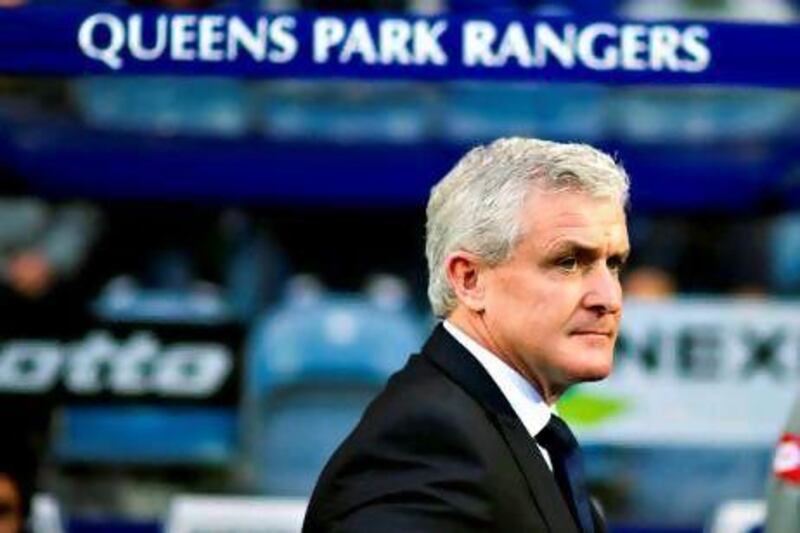It was just over a year ago, while he was between jobs, that Mark Hughes picked what he felt was an opportune moment to give an interview. As two of his many distinguished employers prepared to meet in a Manchester derby, Hughes damned his successor, Roberto Mancini.
The Italian, he said, was an autocrat. He would not indulge or understand players, he added, inviting readers to draw a comparison with Hughes himself.
Some 36 hours later, City beat Manchester United 6-1 at Old Trafford. Not for the last time, Hughes's timing and judgement were made to look similarly, and seriously, flawed.
Advance 13 months and Mancini sits at the top of the Premier League table while Hughes props it up.
If the theme of the Welshman's managerial career is trying to recreate what he lost on that December day in 2009 when City dismissed him, the common denominators with his reign at Etihad Stadium are unwanted.
At Queens Park Rangers, too, he may soon lose his job. As at City, he squandered too much money on misjudged signings. After spending the Christmas of 2008 in the relegation zone with City, he has now taken up permanent residence there.
And yet, should his traumatic 10-month spell at Loftus Road be ended shortly, every analysis of his time at QPR is likely to feature two quotes.
The first, when Hughes resigned as the manager of Fulham in June 2011, was his explanation that he was an "ambitious" manager. The implication was that homely Fulham were not good enough for him.
Fast-forward to the present day and Fulham are in the upper half of the Premier League. Hughes, meanwhile, chased the money, joining cash-rich QPR.
And when, despite a defeat that resulted in City's crowning as the Premier League champions in May, QPR survived relegation, Hughes promptly promised they would not be in the same position again. Cue recent quips that they won't: instead of battling relegation on the final day of the season, the thinking goes, they will already be down.
Because QPR have two points fewer than Derby County, statistically the worst team in Premier League history, did at the same stage of the 2007/08 season. And yet, before Saturday's defeat to Southampton, Hughes still insisted he was targeting a top-half finish.
It invited the question of when and where a pragmatist was transformed into a dreamer, just as one of the most admired managers in the game became one of the most derided. Because the difference between Hughes's seemingly inflated opinion of himself and others' diminishing opinion of him has rarely been greater.
After Southampton, a side without a point on their travels, recorded an emphatic win at Loftus Road, Hughes acknowledged: "We have to accept that we're in danger of going down."
It was a statement of the obvious. It was also a conclusion others reached weeks ago.
When the Loftus Road crowd have decided, as they chanted, that some of their players are only at the club for the money, they were only echoing the thoughts of the others. It can feel as though there are African countries with a GDP lower than QPR's wage bill.
So when Hughes claimed, as he did in a newspaper column on Saturday, that QPR have raised expectations, it is through expenditure, not actual achievements. He inherited a team 17th in the league and, with a run of four points from 12 games, has taken them to 20th.
While Hughes's reputation is in ruins, he appears to have forgotten how he made his name.
At Blackburn Rovers, he discovered comparative unknowns such as Ryan Nelsen and Christopher Samba, who were acquired for bargain prices, and plucked hungry players from other clubs' reserves, such as Stephen Warnock and David Bentley. He built from the back, forged a team with a formidable spirit and irritated his superiors because his side were so hard to beat.
It is worth recalling precisely as QPR, with their porous defence, underachieving and overpaid big names and tame capitulation on Saturday, are the antithesis of that Rovers side. It was such a shocking result that even the hugely supportive owner Tony Fernandes changed his tone.
The Malaysian said: "Everyone including me let the fans down."
His mea culpa was admirable but misguided. His mistake was to invest too much trust and too much money in the wrong manager, to be seduced by the rhetoric of Hughes and his agent Kia Joorabchian, to believe, until Southampton stormed Loftus Road, that injuries and officiating accounted for QPR's lowly league position. His are errors borne of enthusiasm and naivety.
The manager's faults are altogether more significant. His recruitment drive has been woeful, his reading of players' abilities and characters equally unsound. In the process, he overrated not just them, but himself. He has illustrated why City got rid of him and why Fulham, flourishing under Martin Jol, may feel glad he walked out in search of supposedly better things.
Because the QPR supporters are in little doubt where the blame lies or what Fernandes's next move should be. The fall of a manager normally brings a wave of sympathy. Given the hubris of Hughes, this time it may not.
Follow us
[ @SprtNationalUAE ]






